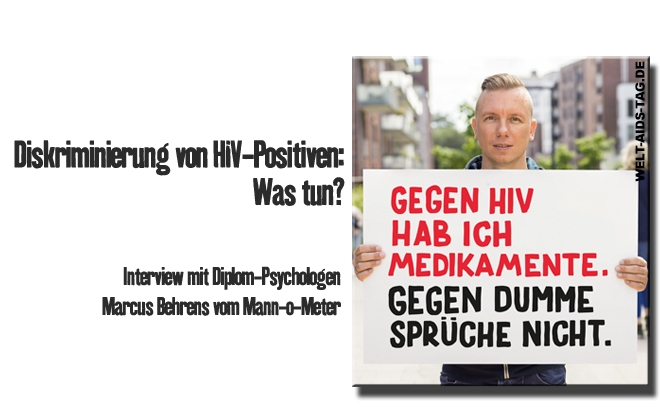Marcus Behrens has been a contact person at Mann-o-Meter, Berlin's gay information and advice centre, for 20 years. The qualified psychologist helps with coming out or addiction problems. Discrimination is also a frequent issue that the head of the centre is confronted with. Interview by Frauke Oppenberg.
Marcus, the credo of the 2016 World AIDS Day campaign is: I can live with HIV, but not with discrimination. How important is this topic?
That is incredibly important. Gay men tend to feel they are already in a bad position because they are not part of the majority. When HIV is added to this, it triggers an incredible amount of stress, including a lot of self-shame. It's not "you get HIV", but "you get HIV". Many people think that they have actively done something wrong, and many gay men experience this as an incredible failure.
Does this make them particularly vulnerable to discrimination?
Yes, being HIV-positive is stressful enough for many people. If other external stress factors are added, then it can tip over. So it can lead to people starting to use drugs and falling into a downward social spiral. That can trigger discrimination. For example, if I realise that it's no longer so easy to get sex in the scene, then I become less attractive. That can put me under so much pressure that I fall off the wagon.
Do you often notice discrimination within the gay scene?
Very often, because HIV is usually only communicated within the gay scene. So if someone is positive, they are often much more reticent about telling people about the infection at work or in the family. But in the scene, which is also about sexuality, it usually becomes an issue. And then I notice rejection much more clearly when it says on Gayromeo or elsewhere: 'No HIV please' or 'Only healthy people'. This always implicitly conveys that you are ill.
Such discrimination online is more or less anonymous. But when a person is sitting directly opposite you...
... that happens too. If I have the feeling that we could end up in a box and then I come out and the other person says: 'Oh, with HIV, I can't do that', then you experience that as rejection at that moment. That means I'm reduced to this virus to a certain extent and of course I experience that as discrimination. There are also some people who become aggressive and say: 'How dare you tell me this so late? Fears are quickly turned into aggression. Sometimes this is not intentional, but HIV is still life-threatening for many people. This harbours a high potential for fear.
You also show a little understanding for the people who discriminate.
I wouldn't say that. I am a psychologist and I ask myself what is behind discrimination. If I want to work with it, then I have to think about what the motive is. And very often I realise that people who discriminate are motivated by fear, an insane lack of enlightenment and a false moral understanding along the lines of 'Only the sluts get HIV. The good guys don't.' When I listen to men who discriminate, I always think: 'Why don't you get out of your little prison? What's so threatening about the other person having HIV?
How should we deal with discrimination?
That is always the question: What makes me strong? How can I cope with something like this? What always helps is to make it public, to talk about it with others, to look for people you can talk to about it, who can offer you relief and with whom you can really process what you've experienced. That can make you much stronger, also because you have to deal with your own self-abuse, which certainly exists. It can also be an opportunity to say: 'That's enough, now I really have to deal with it. I need to deal with this for myself too'. And an external experience like that can force me to take a closer look.
What can happen to you if you eat it instead?
That's difficult because it can lead to a downward spiral, where you always have negative thoughts, you devalue yourself more and more, you feel less and less attractive, and that can really end in depression. Then people often take refuge in alcohol or drugs. It's better to talk about it! Take the space! Just say how you feel!










